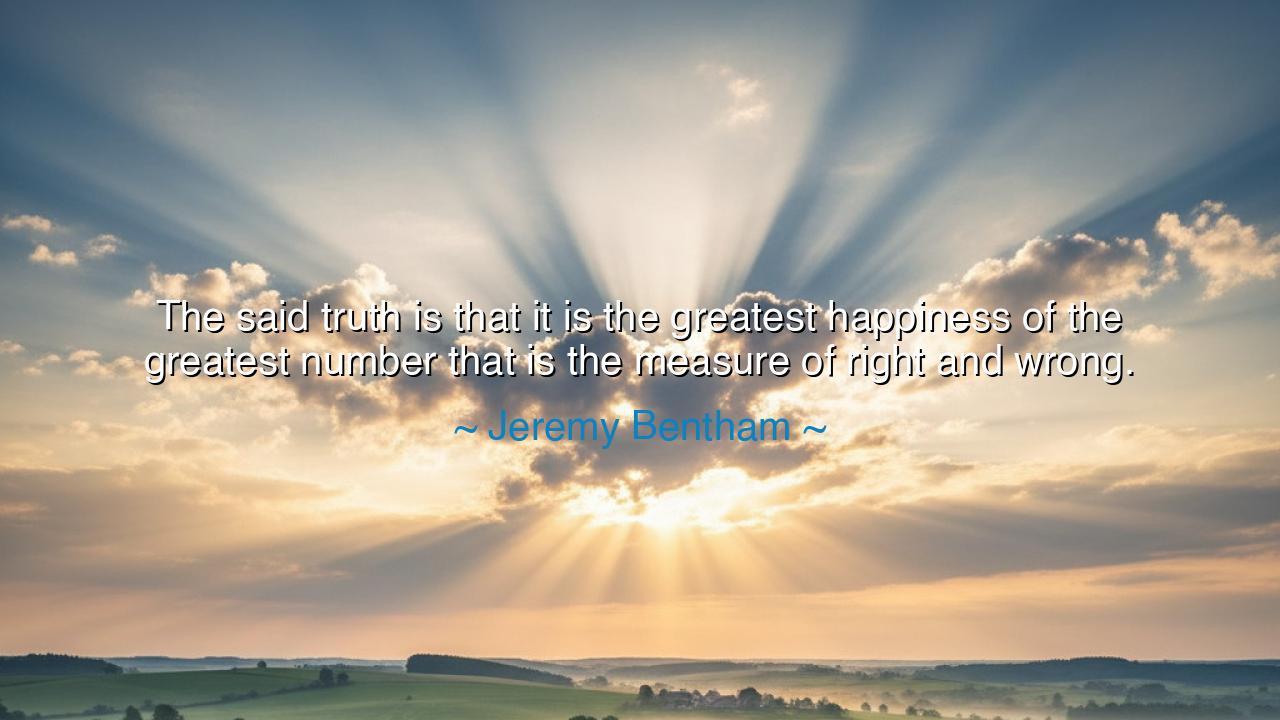
The said truth is that it is the greatest happiness of the
The said truth is that it is the greatest happiness of the greatest number that is the measure of right and wrong.






“The said truth is that it is the greatest happiness of the greatest number that is the measure of right and wrong.” — Thus declared Jeremy Bentham, philosopher and reformer of the Enlightenment, whose words still echo through the chambers of ethics and justice. In this single sentence, he forged one of the most powerful ideas in human moral thought — the doctrine of utilitarianism. It is a teaching both radiant and challenging: that right and wrong are not born of divine decree or personal desire, but of their power to bring happiness or suffering to humankind. The good, Bentham tells us, is that which multiplies joy; the evil, that which multiplies pain.
Bentham lived in an age of transformation — the late eighteenth century — when reason began to wrestle with tradition, and the light of inquiry spread across the world like the breaking dawn. Monarchs still ruled by divine right, and laws still served privilege rather than people. Yet Bentham, with the clarity of a prophet of reason, sought a new foundation for morality, one that did not rest on superstition or social hierarchy. His creed was simple, yet revolutionary: the purpose of every law, every policy, and every action should be the happiness of all, not the power of a few. In those days, when the poor toiled in darkness and justice bent to wealth, his words were a cry of liberation — a call to weigh all choices on the golden scales of human welfare.
At the heart of his teaching lies an idea both compassionate and fierce: that happiness is not a privilege, but a universal right. It is not enough, he said, for one man to prosper while a hundred suffer; nor is virtue measured by the purity of intent alone, but by its consequences upon others. The true measure of goodness, therefore, is not in noble speech or private feeling, but in the real and tangible joy it brings to the many. Bentham’s law is not the law of the strong, but of the just — a moral arithmetic in which every soul counts. And though it demands calculation, it is born not of cold logic, but of deep compassion, for it seeks the flourishing of the whole human family.
Consider how this principle has guided the march of history. When the plague of slavery darkened the earth, there were those who profited from its cruelty and called it “necessary.” But others — abolitionists like William Wilberforce and Frederick Douglass — saw the vast ocean of suffering it caused and knew it to be wrong. By Bentham’s measure, their cause was righteous not because it followed tradition or law, but because it lessened the world’s pain and increased its joy. The abolition of slavery, the education of the poor, the reform of prisons, the rights of women — all these movements drew from the same sacred spring: the belief that what uplifts the many is holy, and what crushes them is sin.
Yet Bentham’s truth is not an easy one. To live by it demands humility and vigilance. It calls us to look beyond our own comfort and to measure our actions by their impact upon others. It reminds us that no one’s happiness is sacred if it is built upon another’s suffering. It asks us to think as citizens of a shared humanity, not as isolated individuals. For there is a subtle tyranny in selfishness — a blindness that mistakes personal pleasure for good. True virtue, Bentham teaches, is broader and braver: it is the art of caring for the world’s welfare as one’s own.
The ancients, too, knew a reflection of this wisdom. In the dialogues of Socrates and Plato, we hear that justice is the harmony of all souls within the city — that no man can be happy in a state that is unjust. In the teachings of the Buddha, we find the same principle: that happiness flows from compassion, and suffering arises from selfish desire. Bentham’s doctrine, though shaped by reason, is thus in harmony with the spiritual heart of humanity — the eternal law that what we give to others, we give to ourselves. For in serving the many, we find the highest form of joy: the joy of meaning.
The lesson, then, is this: measure your deeds not by how they please you, but by how they bless the world. Ask not, “What will I gain?” but “Whom will this help?” Before you act, look into the faces of others and see in them your own reflection. If your choice brings them peace, then it is right; if it brings them pain, then it is wrong. In this way, each of us may become a guardian of the greatest happiness — not through grand gestures, but through daily compassion, fairness, and understanding.
So remember, my child: the path of goodness is not the narrow road of self, but the wide way of empathy. Live so that your joy and the joy of others are one and the same. Build your life not upon conquest or pride, but upon the gentle strength of kindness. For when all people learn to seek the greatest happiness of the greatest number, the world shall at last rise from darkness into the radiant light of justice — and in that light, every soul shall find its peace.






AAdministratorAdministrator
Welcome, honored guests. Please leave a comment, we will respond soon